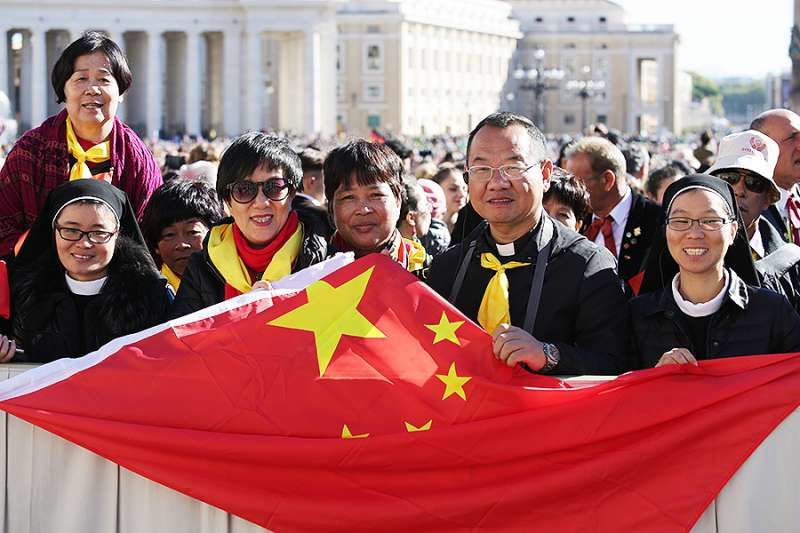Police have detained a Catholic bishop at the center of controversy over a possible agreement between the Vatican and China.
Bishop Vincent Guo Xijin of Mindong in China’s Fujian province is a 59-year-old underground bishop, loyal to the Holy See.
At 3 p.m on March 26, the bishop was called to the Office for Religious Affairs and met with officials for at least two hours, though it is not known what was discussed. At 7 p.m. he returned to his residence and prepared his luggage. At 10 p.m. he was taken away. Police also took the chancellor of the diocese, Asia News reports.
Last year the bishop was detained before Holy Week. The 2017 detention disrupted the celebration of his first Chrism Mass since the 2016 death of his predecessor, Bishop Vincent Huang Shoucheng, who spent 35 years in labor camps and prisons.
Asia News said there are rumors among some Catholics that he was kidnapped after refusing to concelebrate Easter liturgies with Bishop Vincent Zhan Silu, one of seven illicitly ordained bishops favored by the government.
The Church in China is split between an underground Catholic Church and the officially recognized Chinese Patriotic Catholic Association. Every bishop recognized by Beijing must be a member of the association. The Holy See is in negotiations with the Chinese government that could eventually lead to Vatican recognition of seven illicitly ordained bishops aligned with Beijing and to a more normal life for underground Catholics.
Many underground bishops, priests, and lay faithful have faced persecution and harassment.
In January, Asia News reported that a Vatican delegation asked Bishop Guo voluntarily to accept a position as coadjutor bishop under Bishop Zhan. This was also among the conditions Chinese officials had proposed to Bishop Guo during his 2017 detention.
The bishop is not permitted by Chinese authorities to wear a miter or use a crozier. He can only wear a priest’s vestments.
Bishop Guo has said he would be willing to step down; if presented with an authentic document from the Vatican “then we must obey Rome’s decision,” he said ahead of a February Mass at Mindong’s cathedral, the New York Times reports.
“Our consistent stand is to respect the deal made between the Vatican and the Chinese government,” he said. “Our principle is that the Chinese Catholic Church must have a connection with the Vatican; the connection cannot be severed.”
At the same time, he has warned that Chinese authorities seem unwilling to allow the Vatican final authority over the Church. While they do not say explicitly, there is an “implication” that they see the Church in China as independent from Rome.
Bishop Guo said the Chinese authorities’ restrictions on the underground Church in fact limit the voice of Chinese Catholics in the global Catholic Church. While the bishop said he thinks the government is gradually opening up, the government still has concerns about Catholics’ relationship with the Vatican.
The Fujian province has about 370,000 Catholics and has a strong underground presence. Most of the approximately 80,000 Catholics in the Diocese of Mindong are underground Catholics, including about 50 priests and 100 nuns, according to UCA News.
In December 2017, the Holy See asked 88-year-old Bishop Peter Zhuang Jianjian of Shantou in Guangdong province to retire so that an illicitly ordained excommunicated bishop could take his place and be recognized by the Vatican, Asia News reports.
However, the Vatican-recognized bishop reportedly refused the delegation’s request that he retire.
rnThe controversies are part of a delicate diplomatic effort to advance Vatican-Chinese relations while also considering the circumstances of underground Catholics. Archbishop Claudio Maria Celli, president emeritus of the now-suppressed Pontifical Council for Social Communications, is responsible for the negotiations and was identified by Asia News as head of the Vatican delegation.
Even bishops in the patriotic association can be faithful to the Holy See, and they sometimes bristle against the association.
For its part, the Chinese government under President Xi Jinping is pursuing an effort to “Sinicize” religion. In his role as general secretary of the Communist Party, Xi called last October for “new approaches” to religious and ethnic affairs.
China instituted a major change in its religious oversight March 22 by abolishing the State Administration for Religious Affairs and shifting direct control to the Chinese Communist Party’s United Front Work Department. As a result, the Chinese Catholic Patriotic Association will now be under the day-to-day direct supervision of the Chinese Communist Party.
There are differences of opinion about the Vatican-China agreement between the bishops emeriti of Hong Kong. Cardinal Joseph Zen Zi-kiun strongly opposes the deal, variously characterizing it as a “surrender” or “suicide” that would damage the Church and put too much power in the hands of Chinese officials.
“Better no deal than a bad deal,” the cardinal told Raymond Arroyo, host of the EWTN news show The World Over.
For his part, Cardinal John Tong Hon has voiced support for a proposed deal on how Catholic bishops are appointed, saying he believes the Chinese government has generally become more tolerant, and an accord would help bring further openness and unity to the Church.
He said opposition to the accord is “unreasonable” because the deal aims at unity. He called the agreement “far-sighted,” saying that at times, sacrifice is necessary in order for Catholics to become “members of one family.”

